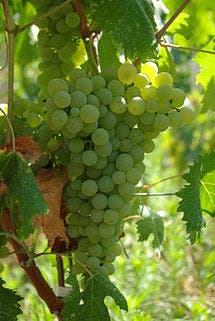
The hot vintages of the 2008 and 2009 growing season definitely put South Aussie vineyards through their paces, especially in the hotter regions. For many vignerons these record heat conditions punished vines, stalling flavour development while sugar levels raced ahead.
While there have been plenty of good and even exceptional wines made, many of these wines carry the double albatross of excessive alcohol and dead fruit even after reverse osmosis. In hotter regions particularly, many traditional varietals suffered, with low yields, excessive baume and loss of varietal flavour being just some of the side effects. Varieties commonly found in the warmer parts of Europe fared much better in terms of vine health during the heatwave and fruit quality when picked. I wondered to what extent these extreme vintages would influence the planting of warm climate cultivars like Vermentino and if Vermentino has a viable mainstream future. You may well ask why I wondered, well I’m a big fan of Vermentino. Vermentino is a white variety common in Sardinia and Liguria. The vine tends to create excellent flavour with low alcohol and good acidity if picked early and is ideally suited to warm regions and hot vintages. Chalk Hill, Oliver’s Taranga and 919 Wines produce exceptional examples locally. For the moment Vermentino also offers a transferrable proposition to the end consumer… if you like one Australian Vermentino, chances are good that you will also enjoy others. For producers it means that marketing of the varietal is pretty collegial – by promoting Vermentino, you are supporting both your brand and others who support it too… sounds like Vermentino might be here to stay. For Corrina Wright (Oliver’s Taranga in McLaren Vale) the decision to plant Vermentino was confirmed during the Victorian bushfires in 2009. She had shortlisted Vermentino as a white variety with which she could produce a wine of equal quality to the formidable reds she produces. Corrina had ruled out more traditional varieties for not consistently producing exceptional quality of wine in McLaren Vale. Vermentino was on her shortlist because it is “widely planted in warmer parts of Europe like southern Italy, Spain, and warmer parts of France and can produce exceptional wines very well suited to our Mediterranean lifestyle”. Standing in the middle of Chalmers vine nursery on a day where temperatures reached 50 degrees, Corrina watched Shiraz and other traditional vines lying flat and dropping fruit. Vermentino remained healthy and upright. For her, the fact that the variety was already producing some superb wines from the Riverland was also a key factor in the decision to plant. She sees Vermentino as producing lighter wines that are both easy drinking and very food friendly. They commonly offer an accent on lime, lemon-blossom, sea spray, herbal, minerality and bright acidity.
Cheat Sheet
| Vermentino is originally from the island of Sardinia and there are over 40 clones found in Italy. |
| If you like Sauv. Blanc, you'll love this. |
| Many Australian winemakers are turning to Vermentino; it offers delicious complexity and acid retention in warm climates. |
..



